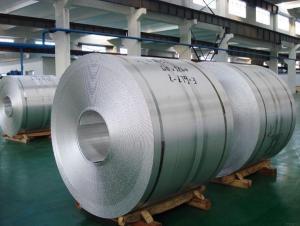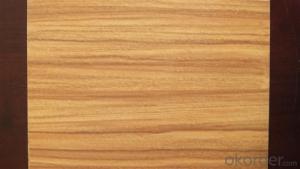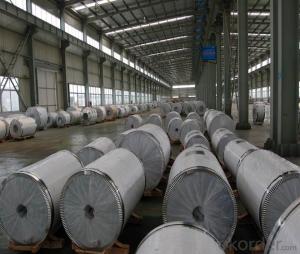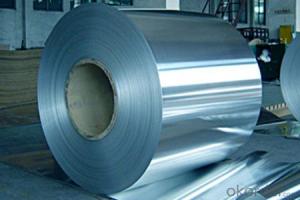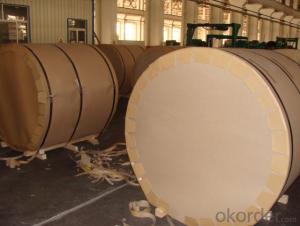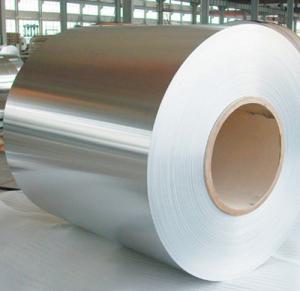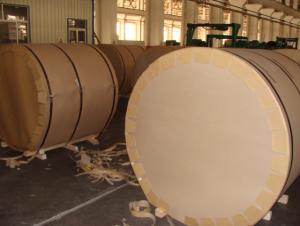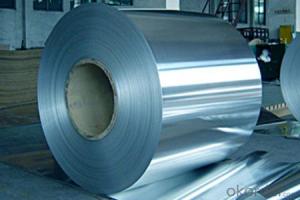Ams Aluminum Coil - Mill Finished Continuous Casting Aluminum Coils 1mm
- Loading Port:
- China Main Port
- Payment Terms:
- TT or LC
- Min Order Qty:
- -
- Supply Capability:
- -
OKorder Service Pledge
OKorder Financial Service
You Might Also Like
1.Structure of Product Description
Mill Finished Continuous Casting Aluminium Coils is one semi-finished aluminium material. The material can be used in building, decoration, ships building, plane building industry. Its weight is much lower than steel. So many customers choosed aluminium material instead of steel. Moreover, it has better quality of anti-rust and long live period.
2. Main features of the product
a.Competitive price---We have our own mills and can produce mill finished aluminium coils, so we can control the production cost better.
b.Professional after-sale service---We have more than 15 years exportation experience and you need not worry about the exporation problems.
c.Fast delivery time---We can control the delivery time within 35 days.
3.Image
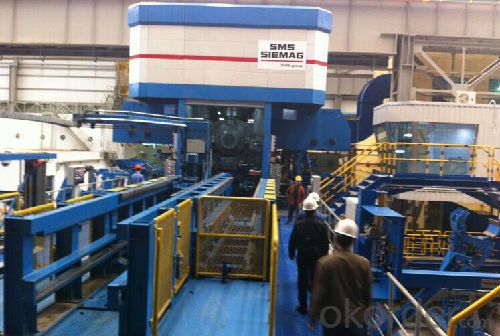
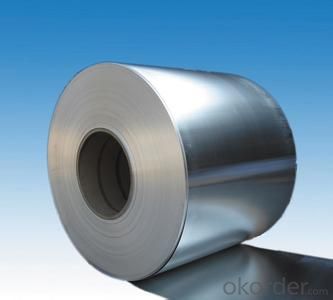
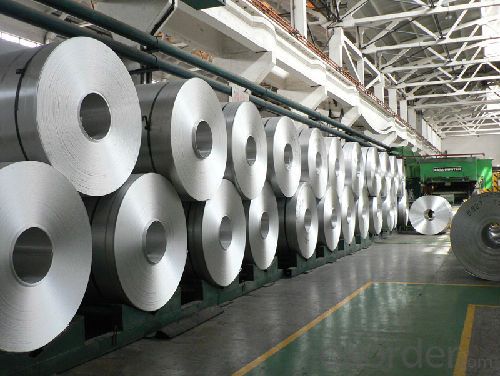
4. Products Specification
| Alloy | Temper | Coil ID | Coil Weight | Thickeness |
| AA1XXX,AA3XXX | H14,H18,H24,HO | 505MM | 2-2.5 TONS | 0.2-3MM |
5. FAQ:
What is the quality standard?
---Usually our standard is GB3880-2006
What is the largest width?
---It is 2300mm
What is the MOQ?
---Usually we can accept 80 tons.
- Q: What are the production processes of aluminum coil and what are the functions of various industrial furnaces in the production of aluminum? The more detailed, the better. Thank you! Points!
- General steps are as follows: melting - hot rolling - cold rolling - annealing – shearing – straightening – punching
- Q: What precautions should be taken while using tools for handling aluminum coils?
- <p>When handling aluminum coil tools, it's crucial to follow safety measures to prevent accidents. Always wear appropriate personal protective equipment (PPE) such as gloves, safety glasses, and closed-toe shoes. Ensure the tools are in good condition and well-maintained. Keep the work area clean and free of debris to avoid slips or trips. Be cautious of sharp edges on the aluminum coils, as they can cause cuts. Use lifting equipment when necessary and never attempt to lift heavy coils manually. Follow all manufacturer guidelines for the safe operation of the tools. Regularly inspect the tools for any signs of wear or damage and replace them as needed.</p>
- Q: What is the corrosion resistance of aluminum coils in saltwater environments?
- Aluminum coils have excellent corrosion resistance in saltwater environments due to the formation of a protective oxide layer on their surface. This oxide layer acts as a barrier, preventing direct contact between the aluminum and the corrosive saltwater, thereby reducing the risk of corrosion.
- Q: Can aluminum coils be used for architectural applications?
- Yes, aluminum coils can be used for architectural applications. Aluminum is a versatile and lightweight material that offers excellent corrosion resistance, making it suitable for various architectural purposes. Aluminum coils can be used for exterior cladding, roofing, facades, and even interior applications like ceilings and wall panels. The coils can be easily formed, cut, and shaped, allowing for flexibility in design and creative architectural solutions. Additionally, aluminum coils can be coated with various finishes, such as paint or anodized coatings, to provide enhanced aesthetics and durability. Overall, aluminum coils are a popular choice in the architectural industry due to their versatility, durability, and aesthetic appeal.
- Q: Can aluminum coils be used in the production of aluminum curtain walls?
- Indeed, aluminum coils possess the capability to be utilized in the fabrication of aluminum curtain walls. In the manufacturing procedure of aluminum curtain walls, it is customary to employ aluminum coils as the primary material. These coils are subjected to various processes, such as rolling, cutting, and shaping, in order to fashion the desired components of the curtain wall system. Due to its lightweight nature and resistance to corrosion, aluminum proves to be an optimal substance for curtain walls, as it imparts both structural stability and durability to the building facade, along with an appealing aesthetic. In essence, aluminum coils assume a vital role in the creation of aluminum curtain walls, guaranteeing the excellence and functionality of the end product.
- Q: How should aluminum coil be stored to maintain its quality and prevent damage?
- <p>The best way to store aluminum coil involves several key practices: Store the coil in a clean, dry, and well-ventilated area to prevent moisture and dirt accumulation. Ensure the storage area is free from corrosive substances and temperature fluctuations. Use pallets or racks to keep coils off the ground, and avoid stacking heavy items on top. Protect coils with plastic covers or wrapping to prevent dust and scratches. Organize coils by size, type, and grade for easy access and to prevent damage during handling. Regularly inspect stored coils for signs of damage or corrosion and rotate stock to minimize prolonged storage of any single coil.</p>
- Q: Are aluminum coils available in custom sizes?
- Yes, aluminum coils are available in custom sizes.
- Q: Can aluminum coils be used in the manufacturing of medical devices?
- The use of aluminum coils in the manufacturing of medical devices is possible. Aluminum is a versatile material that offers numerous advantages for medical device production. It possesses qualities such as being lightweight, corrosion-resistant, and possessing good thermal conductivity. These properties make aluminum coils suitable for a variety of medical applications, including medical imaging equipment, surgical instruments, and prosthetics. Medical imaging devices, like MRI and CT scanners, often utilize aluminum coils for transmitting and receiving electromagnetic signals. Aluminum's electrical conductivity allows for efficient signal transmission, improving the precision and quality of medical imaging. Furthermore, the lightweight nature of aluminum makes it easier to handle and maneuver during medical procedures. Surgical instruments also benefit from the use of aluminum coils in their manufacturing. These instruments require materials that are both sterilizable and durable, with high strength. Aluminum meets these criteria as it can be easily sterilized using various methods, such as steam, ethylene oxide, or gamma irradiation. Additionally, its durability ensures that the instruments can withstand repeated sterilization cycles without degradation, while its high strength guarantees they can endure the forces applied during surgical procedures. Moreover, aluminum can be employed in the production of prosthetics, specifically artificial limbs. The lightweight nature of aluminum makes it an excellent choice for creating prosthetic devices that are comfortable for patients to wear and move around with. Additionally, its corrosion-resistant properties make it suitable for long-term use, as it can endure exposure to body fluids and environmental factors. In conclusion, the use of aluminum coils in the manufacturing of medical devices is indeed possible. The lightweight, corrosion-resistant, and electrically conductive properties of aluminum make it a valuable material for medical applications, contributing to the development of advanced and reliable medical devices.
- Q: Are aluminum coils resistant to moisture?
- Indeed, moisture poses no threat to aluminum coils. Being inherently resistant to corrosion, aluminum possesses an innate capability to combat the detrimental effects of moisture and other environmental elements. Consequently, it becomes an exceptional option for endeavors where moisture resistance holds paramount importance, including HVAC systems, refrigeration units, and outdoor equipment. Furthermore, aluminum can be fortified with an assortment of protective coatings and treatments to augment its moisture resistance and prolong its lifespan. In summary, the durability and moisture-withstanding capacity of aluminum coils render them a dependable choice across diverse industries.
- Q: hey, my dad and i are working on painting our front door and the current piece of aluminum in front of it wont go with the new color. it doesnt look like it can be changed out so we are wondering, other than spray paint, what can you put on aluminum to make it turn permanently black. my dad mentioned gun blue, but that only works on steel. thanks
- Dad is on the right track....maybe. There are blackeners for aluminum you can get from gunshops. Used to touch up scratched or worn black anodized finish on aluminum gun parts. Never used it in large areas. Best regards
Send your message to us
Ams Aluminum Coil - Mill Finished Continuous Casting Aluminum Coils 1mm
- Loading Port:
- China Main Port
- Payment Terms:
- TT or LC
- Min Order Qty:
- -
- Supply Capability:
- -
OKorder Service Pledge
OKorder Financial Service
Similar products
Hot products
Hot Searches
Related keywords
